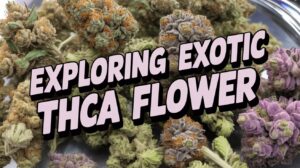The next generation of cannabinoids is upon us, and if you’re wondering about which one to choose between the two biggest names on the scene right now, THC-O vs. THC-P, we’re here to give you some insight!
Main KeyPoints
- THC-O is one of the fully synthetic cannabinoids that don’t exist naturally in the cannabis plant.
- THCP is a natural cannabinoid in the cannabis plant.
- THCO is currently federally illegal, while THCP is federally legal.
- Studies show that THCO has 3x the potency of THC, while THCP has 33x the potency.
- You can buy THCP products online.
What Is THC-O?
THCO or THC-O acetate is a THC analog synthesized from Delta-8 THC through a chemical process called acetylation to create a more potent form of THC.
Unlike the other popular cannabinoids, THCO doesn’t occur naturally in cannabis plants; it has to be made in a lab.
How Is THC-O Made?
To create THC-o acetate, labs combine synthesized Delta-8 with acetic anhydride (which is highly flammable and explosive, so don’t get any ideas of DIYing THC-O).
This type of controlled chemical reaction replaces a hydrogen group with an acetyl group; this process strips the compound from all terpenes and flavonoids, leaving only a more formidable form of THC.
THC-O Benefits
According to users, THC-O has the following benefits:
- An increase in creativity
- Deep relaxation
- Relief from anxiety
- Higher psychoactive benefits
THC-O Effects
Users report that THC-O has 3x of the psychoactive effects of Delta-9 THC; some even describe it as a psychedelic or spiritual cannabinoid.
Some users tend to experience a surge of creativity accompanied by mild hallucinations and visual that almost feels like a meditative high.
Is THC-O Legal?
Up till recently, we all thought THC-O was legal under the Farm Bill that legalized hemp plants, but early this year, the DEA came out with a statement that THC-O is, in fact, an illegal substance under federal law.
But don’t despair; your local laws might still allow it, so it’s worth checking.

What Is THC-P
THCP is the new star on the rise; it’s a rare psychoactive cannabinoid found naturally in cannabis plants.
What makes THCP the next big thing is that it’s a natural compound with more binding affinity to our cannabinoid receptors than any other cannabinoid, natural or synthetic.
The Benefits Of THC-P
Based on early animal studies, researchers concluded that THCP could be able to:
- Relive Pain
- Reduce anxiety and stress
- Treat insomnia
- Control nausea
- Control seizures
- Stimulate appetite
- Higher psychoactive effects
The Effects of THC-P
With its immense ability to activate the body’s cannabinoid receptors, THC-P comes with a powerful high, and many attest that it’s 10x that of normal THC.
In small doses, studies and users reported both a cerebral and a body high that relieves pain and eases anxiety, but in large doses, THCP could leave users in a state of trance.
The Differences Between THCO vs. THCP
As two strong contenders in the cannabis industry, you must wonder how they differ and which one would make the best fit for you.
Here are the top differences between the two compounds.
The Source Of Each Compound
THCP is a naturally occurring cannabinoid within the cannabis plant. However, THC-O is a non-natural cannabinoid that is only made in a lab.
The Effects
While cannabis enthusiasts raved about THC-O being the strongest cannabinoid due to its potent psychoactive effects that users reported were 3x that of the regular THC, THCP highjacked the title as scientists estimated it has 33x the strength of THC.
The Legal Status
Now that the DEA officially announced that THC-O is a synthetic cannabinoid, it has become a scheduled substance under federal law, while THCP is federally legal.
State laws vary on cannabinoids, whether they’re federally legal or not, so always check your local laws.
Where To Buy THC-P Products?
Due to its federally legal status, you can buy THCP products from your local dispensary or brick-and-mortar store, and of course, you can indulge in the modern bliss of online shopping.
Available THCP Products
As a newcomer, THCP isn’t available in a huge variety of products, and it’s always combined with other hemp-derived cannabinoids.
As of now, here are the available THC-P products that you can find:
- THCP vape cartridge
- THCP flower
- THC-P Gummies
- THCP oil tincture
Final Thoughts – THC-O vs. THC-P
Both cannabinoids carry effects that many cannabis users seek, but it all depends on the type of experience you’re looking for and, of course, the local laws of your state.
THCO is currently federally illegal, while THCP sourced from hemp is federally legal.
If it’s an all-rounded experience with a strong buzz you’re after, then our THCP gummies will treat you right.
However, if you want to dip your toe in something less psychoactive than THCP but still hits harder than THC, then go for some THCO.

Legal Disclaimer:
By reading this information presented, you agree to release the author of any liability that comes from using this data. This post contains no legal advice. Claims about cannabinoids have not yet been approved by the FDA. Read the full legal disclaimer here.
Other related articles:
THCP Gummies Review – What To Expect
Does THCP Get You High? How Potent Is It
What Is THCP? Is It Worth The Hype
Is THCP Legal In the United States? Get The Latest Updates
THCP vs. Delta-9 THC – Which Is Better For You
Delta-8 vs. THCP – Which Is Stronger
Do Delta-9 THC Gummies Help With Pain Relief
Delta-9 THC Gummies Review – The Best Legal THC Gummy
Resources
FAQs About THC-O vs. THC-P
THC-O edibles from reputable companies are safe. However, recent studies suggest that products that require heating THC-O, such as smoking THC-O could cause the formation of a lung toxicant called ketene.
We would advise you to avoid vaping THC-O acetate.
THCP sourced from a hemp plant is federally legal.
There’s a wide range of THC-O products, such as THC-O edibles, oil tinctures, and THC-O vape cartridges, but we recommend avoiding smoking THC-O in any way.
Quite the opposite! THCP has an even stronger affinity to bind with cannabinoid receptors than THC.







